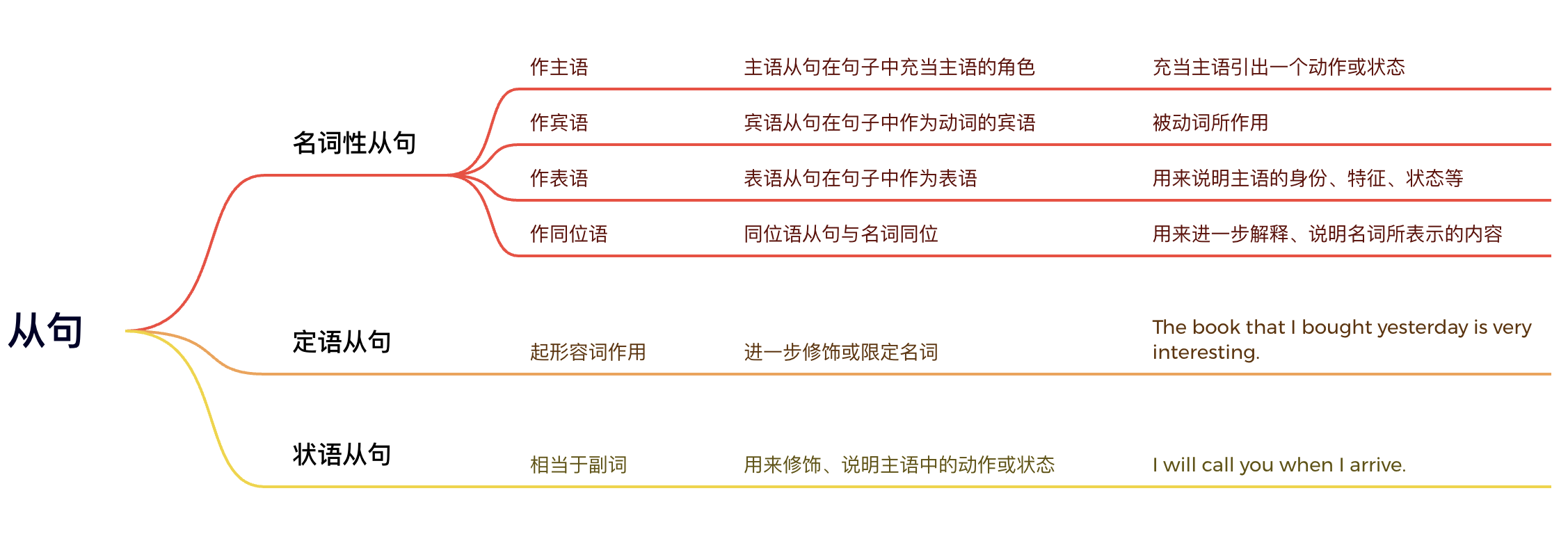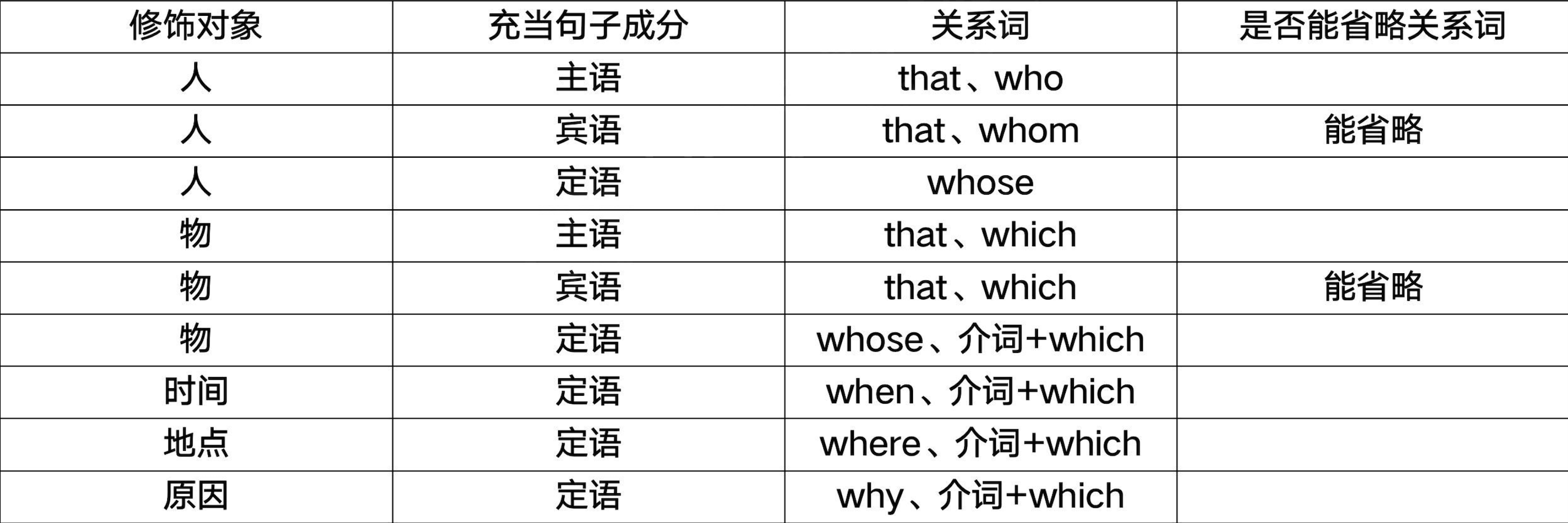12_从句

根据从句语法功能的不同可分为:主语从句、宾语从句、表语从句、同位语从句、定语从句和状语从句6类。
一、名词性从句
用一个句子代替句子里面的一个名词。分为主语从句、宾语从句、表语从句、同位语从句
1.1 主语
主语从句在句子中充当主语的角色,用来引出一个动作或状态的主题。
What he said doesn‘t matter. // 他说的话无关紧要。
1、引导词
需要加连词作为引导词
// 连词
that(那)、whether(是否)
// 代词
Who, whoever(任何人),whom, whose, what, whatever,which,whichever
// 副词
when, where, how, why, whenever,wherever,however
2、注意点
1、经常用形式主语it放主语位置,真的主语后置
// 他赢得这场比赛是肯定的
That he will win the match 'is certain'.
// 他一定会赢得这场比赛的
'It is certain' that he will win the match.
2、一定不能放句首的情况
// if/whether引导的主语从句
It is uncertain whether/if he will come this evening. // 不确定他今晚是否会来
// It is said开头的结构
It is said that he never laughed. // 据说他从来不笑
// It happens、It occurs结构
It happens to me that I meet my professor. // 我碰巧遇到我的教授
// It doesn't matter how/whether结构
It doesn't matter how it happened. // 怎么发生并不重要
// 疑问句时
Is it sure that you will come back here? // 确定你要回到这里吗?
3、it主语从句和强调句的区别
判断方法:去掉it、be、that后看句子是否完整
It is certain that he will come here. // 肯定他会来这里,去掉it is、that后句子不完整
It was in the hospital that I saw the Peter. // 我在医院看见的是皮特
4、连接单词后动词单复数情况
主语从句多数情况下是第三人称单数,但是连接代词what引导的主语从句,后面的谓语的动词单复数要根据句子的意思决定。
What we need is time. // 我们需要的是时间
What we neet are good doctors. // 我们需要的是好医生
5、时态不受主句影响
It is to join a gun club that he will grow-up. // 他长大了要参加一个枪械俱乐部
1.2 宾语
宾语从句在句子中作为动词的宾语,被动词所作用。
例如:"I know where he lives."(我知道他住在哪里。)
1、引导词
宾语从句引导词
// 连词
that '常可以忽略', whether, if
// 代词
who, whose, what, which
// 副词
when, where, how, why
当主语是一般现在时或一般将来时的时候,从句可以是任何时态
当主语是一般过去时的时候,从句时态必须是过去时范围内的时态

2、注意点
1、宾语从句的种类
// 1、动词的宾语从句
Tell your son that playing game too much is bad for his eyes. // 告诉你儿子玩太多游戏对他眼睛不好
// 2、介词的宾语从句
It all depends on whether it will be fine tomrrow. // 这完全取决于明天的天气是否晴朗
// 3、形容词的宾语从句
I am sure that he will come soon. // 我确信他很快就会来了
2、it做形势宾语
动词find、feel、consider、make、believe、think等后面有宾补的时候要用it做形式宾语,将that宾语从句后置
I find it interesting that talking to you. // 我觉得和你谈话很有意思
I think it best that you should stay here. // 我认为你最好住这
3、宾语从句是否转移
think、believe、imagine、suppose、guess等否定时,会转移到从句上
I don't believe that the carr is good. // 我相信这车不好
I don't think that he will come back now. // 我认为他现在不会回来
4、that不能省略
都不省也可以,不会错
// 1、当主句谓语动词带两个或以上的宾语从句时,可以省略第一个that,其他的从句that不能省
I realize you are a hero and that everybody accepts your leadership. // 我意识到你是个英雄,每个人都接受你的领导
// 2、宾语从句的主语是非谓语动词或者主语从句,that不能省
He said that studying English is every hard. // 他说学英语非常难
// 3、主语中的谓语动词是固定搭配的时候,that不能省
Mary has made up her mind that she will study hard for the scholarship. // 玛丽已经打定主意,她将努力学习拿奖学金
// 4、宾语从句的主语是this/that,或this/that做主语的定语时
He said that this would leead their ancestors to earth. // 他说将把他们的祖先带到地球
// 5、宾语从句放在in、except、bu等介词后面,that不能省
He is a good student except that he is a little careless. // 他是个好学生,除了有点粗心外
// 6、it做形式宾语时
We throught it strange that you did you did not come yesterday. // 我们认为很奇怪,你昨天没来
// 7、that宾语从句放句首表示强调
That he ever said such a thing, I can not believe. // 我不能相信,他曾经说过这样的话
// 8、主句谓语动词和宾语从句自己有插入语的时候
Everyone could see, I believe, that Pater was really afraid. // 每个人都可以看到,我相信,皮特很害怕
// 9、宾语从句的前面或后面紧跟一个状语时
He suddenly caught sight of the boy and realized at once that he had seen him before. // 他突然发现了这个男孩,立刻意识到自己曾经见过他
1.3 表语
表语从句在句子中作为表语,用来说明主语的身份、特征、状态等。
例如:"The important thing is that we all do our best."(重要的是我们都尽力而为。)
1、引导词
// 连词
that、whether、as if、as though
// 代词
who、whose、whom、what、which
// 副词
when、where、how、why、because
2、注意点
1、种类
// 1、that引导
The reason was that he was late for school. // 原因是他上学迟到了
// 2、whether、as、as if引导
The question is whether they will be able to help us. // 问题是他们是否能够为我们提供帮助
// 3、连接代词who、whom、whose、what、which等在表语从句做主语和宾语
The problem is who we can get to replace her. // 问题是我们能找到谁来代替她
// 4、连接副词where、when、how、why
This is where they once lived. // 这是他们曾经住过的地方
// 5、连词because
I think it is beause you are doing too much. // 我认为这是因为你做的太多了
// 6、一些表示建议劝说命令的名词后面
My suggestion is that we should start early tomorrow. // 我的建议是我们明天早点开始
2、if和whether
只能whether引导的句子:表语从句、介词后面的宾语从句、句首的主语从句、同位语从句
if和whether都可引导的句子:宾语从句
// 问题是他们是否能够为他们提供帮助
The question is if they will be able to help us. (错)
The question is whether they will be able to help us. (对)
1.4 同位语
同位语从句与名词同位,用来进一步解释、说明名词所表示的内容。
例如:"The news that he won the prize pleased us all."(他获奖的消息让我们所有人都很高兴。)
1、引导词
// 连词
that(不能省略), whether
// 代词
what, who, whom, whose, which
// 副词
when, where, how, why
2、注意点
1、结构
// 1、主语 + 同位语从句 + 其他
The news that he will come here is real. // 他要来这里的消息是真的
// 2、主语 + 同位语从句
The news that he will will come here. // 他要来这里的消息
2、同位语从句和定语从句的区别
先行词(被修饰的东西)的区别
// 同位语从句全面只能是idea、fact、news、suggestion等内在含义的名词。
The news that he will come here. // 他要来这里的消息
// 定语从句前面可以是名词、代词、部分句子、整个句子
He will come here, which made us very excited. // 他会来这里,这让我们非常兴奋
性质的区别
// 同位语从句是对前面的名词做解释,可以翻译成什么什么是什么
The news that our team has won the game. // 消息是我们队赢了那场比赛
// 定语从句是对前面的东西做修饰,可以翻译成什么样的什么
The news that he told me yesterday. // 昨天他告诉我们的消息
引导词的区别
how、whether,that可以引导同位语从句,不能引导定语从句
that引导同位语从句时不能省略,引导定语从句经常省略
二、形容词性从句
定语从句
用来修饰一个名词或代词,对其进行详细的描述或限定。这个名词或代词被定语从句所修饰。定语从句通常由关系词引导,如who, whom, whose, which, that等。定语从句可以出现在句子中的不同位置,包括名词的前面或后面,这取决于所修饰的名词的位置。
定语从句的作用是进一步说明或限定名词,并可以在句子中起到形容词的作用。
// 这里,定语从句 "that I bought yesterday" 修饰名词 "book",进一步说明了买的具体时间,并起到了形容词的作用。
The book that I bought yesterday is very interesting. // 我昨天买的书非常有趣。
或者叫形容词性从句,就是用一个句子代替句子中的定语,修饰先行词。 (定语就是修饰前面的名词或者代词)
先行词(名词/代词):关系词前面的部分
定语从句:先行词 + 关系词 + 从句
He is 'the man' + that + 'I saw yesterday'. // 他就是我昨天见的那个人
2.1 关系
// 修饰人
who, whose, whom, that.
// 修饰物
which, that, whose
// 修饰其他
when, where, why
// who指人:在定语从句中作主语,后面跟动作
The boy who is playing basketball is from out class. // 打篮球的男孩是我们班的
// whom指人:在定语从句中作宾语,可以省略,后面跟完整句子
Peter is a good boy whom I want to see. // 皮特是我相见到的好男孩
// which指物:在定语从句中作主语或宾语,做宾语时可以省略
Football is a game which is liked by most boys. // 足球是大部分男孩都喜欢的游戏
// 【重点】that指人相当于who和whom,指物相当于which。在定语从句中作主语或者宾语,作宾语可以忽略
He is the man whom/that I sam yesterday. // 他就是我昨天见到的那个人
The package which/that you are carrying is about to come unwrapped. // 你拿的包快散了
// whose指人也可以指物,在从句中作定语
He has a friend whose father is a doctor. // 他有一个做朋友的父亲是医生
// whose指物时,whose等于of which
The car whose engine is broken. // 引擎损坏的车
The car engine of which is broken. // 引擎损坏的车
// 介词后面只能跟which
The school (that/which) he come studied in is very famous.
The school in which he once studied is very famous. // 他曾经就读的学校非常有名
2、做什么怎么看
// 后面是动作就是做主语
The boy 'who' is playing basketball is from our class. // 打篮球的男孩是我们班的
// 后面是完整句子就是做宾语
Peter is a good boy 'whom' I want to see. // 皮特是我想见到的好男孩
// 先行词和后面从句翻译要有 的 字就是做定语
He has a friend 'whose' father is a doctor. // 他有一个做朋友的父亲是医生
// when指时间
The time when we got togeter finally arrived. // 我们在一起的时间终于到了
// where指地点
China is the country where I was born. // 我出生在中国这个国家
// why指原因
The reason why she was moved to China. // 之所以她搬到中国
// 关系副词(when、where、why)定语从句可以替换成介词 + which 引导的定语从句
The time when we got togeter finally arrived.
The time in which we got togeter finally arrived.
China is the country where I was born
China is the country in which I was born
The reason why she was moved to China
The reason for which she was moved to China
关系词修饰总结

2.2 注意点
1、只能用that的定语从句
// 1、先行词是everything, anything, nobody, nothing等代词,先行词被every,any,all,some,little等代词修饰
You have everything that you could ever need. // 你有你所能需要的一切
// 2、先行词是序数词或被序数词修饰
She is the first that you were loved. // 她是第一个被你爱的人
// 3、先行词是最高级或者被最高级修饰
This is the best car that I have ever seen. // 这是我见过最好的车
// 4、先行词被the only、the very修饰
It is the only thing that might work. // 只有那个才管用
// 5、先行词前面有who、which等疑问代词
Who is the man that is standing by the gate? // 站在门后的人是谁
// 6、先行词是人和动物,人和物
We talking about the car and peter that is so funny. // 我们正在聊这车和皮特真的很搞笑
2、只能用which不能用that的定语从句
// 指物时候的引导非限定性定语从句
I have a car, which is a sport car. // 我有一辆车,它是一辆跑车
// 关系词之前有介词
The school in which he once studied is very famous. // 他曾经就读的学校非常有名
3、只能用who不能用that的定语从句
// 先行词为one、anyone、those
We were the ones who killed her. // 我们才是杀害她的凶手
// 先行词是人称代词
Only you who can save her. // 只有你能救她
4、限制定语从句和非限定定语从句
非限定一般有逗号与主语隔开,只是对先行词补充说明,删掉不影响主句。主语意思还是完整的,翻译成主句的并列句
// 限定定语从句
Peter was the only person who is a policeman. // 皮特是唯一的警察
// 非限定定语从句
I have a car, which is a sport car. // 我有一辆车,它是一辆跑车
三、副词性从句
状语从句
状语从句是一个从句,它用来修饰、说明主句中的动作或状态。状语从句可以在一个句子中充当时间、地点、原因、条件、目的、方式等不同的状语成分。通常状语从句由连词引导,例如when, while, if, since, because, although, as等。
状语从句和主句之间通常存在逻辑上的因果或逻辑关系,从而对主句中的动作或状态进行补充或解释。
// 这里,“when I arrive”是一个时间状语从句,说明了"call"动作发生的时间。
I will call you when I arrive. // 我到了会给你打电话。
状语从句在句子中的位置灵活,可以出现在主句之前、之后甚至中间。在写作中,状语从句的正确使用可以丰富句子结构,使语言表达更加准确和丰富。相当于副词
3.1 时间
常见引导词:when、as、while、as soon as、before、after、since、not until、until/till
特殊引导词:the minute, the moment, the second, every time, the day, the instant, immediately, directly, no sooner than, hardly when, scarcely when, as soon as
用no sooner... than, hardly...when, scarcely...when引导从句部分倒装
'No sooner' had I arrived home 'than' it began to rain. // 我一到家就开始下雨了
'Every time' I listen to your advice, I get into trouble. // 每当我听取你的建议时,我就会惹上麻烦
'While' john was watching TV, his wife was cooking. // 当约翰看电视时,他的妻子正在做饭
3.2 地点
常见引导词:where
特殊引导词:wherever,anywhere,everywhere
'Wher'e there is no rain, farming is difficult or impossible. // 在没有雨水的地方,耕作时困难的或根本不可能的
They were good persons, 'Where' they went,there they were warmly welcomed. // 他们都是好人,因此他们走到哪里受到热烈欢迎
You should have put the book where you found it. // 你应该把书放回原来的地方
3.3 原因
常见引导词:because、since、as
特殊疑问词:seeing that、now、that、in that、considering(考虑)
My friends dislike me 'because' I an handsome and successful. // 我的朋友都不喜欢我,因为我又英俊又成功
Now that everybody has come, let is begin our conference. // 既然每个人都到了,让我们开始会议吧
3.4 目的
常见引导词:so that、in order that(为了达到某个目的或结果)
特殊引导词:lest、in case、for fear that、in the hope that(我希望)
The boss asked the secretary to hurry up with the letters so that he could sign them. // 老板要求秘书赶快写信件以便他能在上面签字
The teacher raised his voice on purpose that the students in the back could hear more clearly. // 为了让后面的学生听得更清楚,老师有意地提高了他的声音
3.5 结果
常用引导词:so...that, such...that
特殊引导词: such that(这样), to the degree(在某程度上), to the extend that(在某种程度上), to such a degree that(达到这样的程度)
It is such a good chance that we must not miss it. // 这是一个好机会,千万不要错过它
To such a degree was he excited that he could not sleep last night. // 他激动到这个程度,以至于他昨晚睡不着
This news is exciting, so that he jumped up. // 这个消息太令人激动了,以至于他跳了起来
3.6 条件
常见引导词:if,unless
特殊引导词:as/so long as, only if, providing/provided that, suppose that, in case that, on condition that
We'll start out project if the president agrees. // 如果总统同意,我们将开始这个项目
You will certainly succeed so long as you keep on trying. // 只要你继续努力,你一定会成功的
3.7 让步
常见引导词:though(虽然), although(尽管), even if(即使), even though(即使)
特殊引导词:as(必须倒装),while(一般句首),no matter... (不论),in spite of the fact that(尽管事实是), whatever(无论),whoever(无论谁), wherever(无论在哪里), however(不管怎样), whichever(无论哪个)
The old man always enjoys swimming even though the weather is rough. // 这个老人喜欢游泳,即使天气很恶劣
No matter how hard he tried, she could not change her mind. // 不论他如何努力,她都不会改变她的主意
3.8 比较
常见引导词:as(同级比较),that(不同程度的比较)
特殊疑问词:the more ... the more...(越来越), just as ...(与...同样),so...(所以), a is to b what/as x is to y(),no...more than(不超过), not a so much as b
The house is three times 'as big as' ours. // 这房子是我们的三倍大
'The more' you exercise, the healthier you will be. // 你运动的越多,你就越健康
3.9 方式
常见引导词:as, as if, how
特殊引导词:the way
She behaved 'as if' she were the boss. // 她表现得好像她是老板
We teach our children 'the way' our parents have taught us. // 我们用父母教导我们的方式教导我们的孩子
3.10 省略情况
主句和从句的主语一致时,或者从句主句是it从句谓语动词是be动词 可以省略主语和be动词
When(the museum is) completed, the museum will be open to the public next year. // 当博物馆完成,该博物馆将于明年向公众开放
He will go th the seaside for his holiday if(it is) possible. // 如果可能,他将去海边度假的话